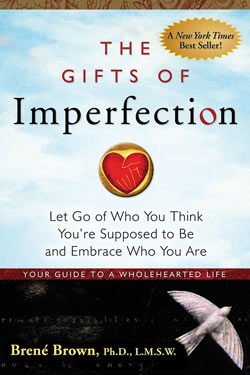 Not other-focused
Not other-focused
Published by: Hazelden; 1 edition [September 1, 2010]
ISBN-13: 978-1592858491
Pages: 160
Price: INR 518
Many of us tend to be our own harshest critics. We analyse and scrutinise our words and deeds [and, possibly, our appearance and demeanour] and deride ourselves for not measuring up to some esoteric standard we hold ideal. “If only I get that promotion; if only I own a beach house; if only I were five kilos lighter; I’d be happier.” We defer the sheer joy of being alive by focussing on external entities that we believe are the indicators of our state of being.
Dr Brené Brown, a research professor at the University of Houston Graduate College of Social Work, has spent the past 10 years studying vulnerability, courage, authenticity and shame. This book is one of the outcomes of her research.
As a champion of wholehearted living, Dr Brown urges us to take a compassionate attitude towards living by learning to embrace our imperfections. We don’t have to be super-parents and successful business managers and gracious friends and marvellous hosts at the same time, all the time. There are many competing values we juggle every day that make life hard enough, without us imposing and demanding our version of perfection in everything and from everyone.
As Dr Brown notes in the book, “Perfectionism is not the same thing as striving to be your best.” Rather than a self-focussed approach of how can I improve? Perfectionism is other-focussed, pressuring us to ask, what will they think? “Perfectionism is, at its core, about trying to earn approval and acceptance. Perfectionism is not self-improvement.”
The book points out the importance of differentiating between perfectionism and striving to be your best. While the latter is a healthy inward-focussed journey, the former is like a heavy shield that we lug around in the hope that it will protect us from blame, judgment and shame.
We are, in truth, vulnerable and imperfect. We make mistakes and we are not always in control. To project an image otherwise is, in essence, an attempt to not be true
to oneself.
Wholehearted living is to actively engage in life from a place of worthiness by being true to oneself. All too often, the terms ‘authenticity’ and ‘being true to oneself’ are left unqualified. At its core, authenticity requires us to shed the preconceived notions of who we think we are, who others think we are and who we [and others] think we are supposed to be. Instead, it advocates that we be guided by our intuition to act in a way that is consistent with our inherent values and ethics. This is a lifelong process that is challenging and ever-evolving.
Dr Brown postulates that courage, compassion, and anchored relationships are the tools to cultivate self-worth and acceptance. The courage that Dr Brown talks about has little to do with heroics. The Latin word for heart, cor, is the root of the word courage, which originally meant, “To speak one’s mind by telling all one’s heart.” Being heroic is about putting one’s life on the line, but being courageous is about putting our vulnerability on the line.
The book offers 10 guideposts for introspection. With illustrative anecdotes from people’s personal and professional lives, the author focuses on one guidepost per chapter to encourage us to cultivate qualities like self-compassion, a resilient spirit, gratitude, joy, even creativity and meaningful work.
Practising gratitude is a big part of being at peace with oneself no matter what hardships and disappointments we face. The book shares practical ways to consciously incorporate gratitude in everyday life, like: maintaining a gratitude journal by writing down the small everyday things we are thankful for; consciously thanking a service staff or a family member for their thoughtfulness; or even vowing not to criticise or complain for a week by only looking at the positives in any tough situation. This form of gratitude practice puts things in perspective where we look at the bad and the good from a place of calmness and composure, rather than with panic and desperation.
One of the startling insights shared in this book is about shame and guilt. While guilt is about our behaviour, shame is about who we are. From career choices to financial status; from personal appearance to housekeeping prowess; from parenting skills to spiritual disposition; guilt and shame lurk in every dark corner of our daily lives, waiting for us to feed it and nurture it till it consumes us.
Feeling guilt is unavoidable. What we do about it, however, is not. Shaming oneself or others is fruitless. Shame becomes a barrier to self-acceptance, it smothers love and joy, thus it is imperative that we get past this debilitating self-recrimination in a manner that is beneficial to our well-being.
One of the ways Dr Brown suggests we handle this is by cultivating healthy relationships rather than placing importance on performance and achievement. Self-esteem thrives via healthy attachments/relationships/connections that are devoid of judgment.
We can strive towards self-acceptance by practising courage and compassion, in alignment with our spiritual self, exercising our creativity, developing meaningful associations and recognising gratitude as a path to joy.
The takeaway message of this book is that when we acknowledge our limitations, recognise our strengths and stop trying to gain the approval of others, we are being authentic, and incidentally, one step closer to leading a purposeful life that is free of self-imposed hurdles of equanimity.
This was first published in the October 2014 issue of Complete Wellbeing.

